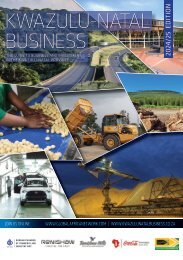Limpopo Business 2016-17 edition
The 2016/17 edition of Limpopo Business is the eighth issue of this highly successful publication that, since its launch in 2007, has established itself as the premier business and investment guide to the Limpopo province. Limpopo is unique in terms of its abundant natural and human resources, and is also one of the key drivers behind the South African economy. This edition of Limpopo Business is officially endorsed by the Office of the Premier of Limpopo.
The 2016/17 edition of Limpopo Business is the eighth issue of this highly successful publication that, since its launch in 2007, has established itself as the premier business and investment guide to the Limpopo province.
Limpopo is unique in terms of its abundant natural and human resources, and is also one of the key drivers behind the South African economy.
This edition of Limpopo Business is officially endorsed by the Office of the Premier of Limpopo.
You also want an ePaper? Increase the reach of your titles
YUMPU automatically turns print PDFs into web optimized ePapers that Google loves.
OVERVIEW<br />
South Africa has received R53.2-<br />
billion in foreign investment.<br />
The overwhelming majority<br />
of projects approved have been<br />
solar and wind and there is now<br />
going to be a focus on finding<br />
ways to promote projects using<br />
biogas, landfill gas and small-scale<br />
hydro electric.<br />
<strong>Limpopo</strong>’s three REIPPP projects<br />
are all of the photovoltaic<br />
solar type, and together they will<br />
generate 118MW at full capacity.<br />
The provincial government’s<br />
Green Economy Plan has identified<br />
solar and biomass as the main<br />
kinds of renewable energy that<br />
the province can pursue.<br />
Nine biogas digesters have<br />
been installed in the Vhembe<br />
District and these will be controlled<br />
by young entrepreneurs<br />
trained by the University of<br />
Venda. A demonstration model<br />
is at the university. A group of<br />
31 students are studying Energy<br />
Management Systems as part of<br />
<strong>Limpopo</strong>’s Green Economy Plan.<br />
Energy generation is not the<br />
only component of the plan: with<br />
huge silicon reserves in the province,<br />
there is potential for the production<br />
of solar panels and solar<br />
chargers for cellphones.<br />
Alternatives<br />
The mining and agricultural sectors<br />
are the two biggest and most<br />
important sectors of the <strong>Limpopo</strong><br />
provincial economy. They are big<br />
consumers of energy and hold<br />
the key to advancing alternate<br />
technologies.<br />
Many mines are looking increasingly<br />
at going off-grid and<br />
are therefore using renewable strategies to achieve that. The agricultural<br />
sector obviously controls all sorts of feedstocks that can be used<br />
to generate power.<br />
Anglo Platinum has launched an underground mining locomotive<br />
powered by a fuel cell. Platinum coating greatly enhances the hydrogen<br />
absorption capacity of fuel cells. The locomotive was developed<br />
together with Vehicle Projects, Trident South Africa and Battery Electric.<br />
Anglo Coal’s operations at Lephalale produce a huge amount of<br />
methane gas. A third of this gas is now being used to power fuel cells.<br />
Anglo Platinum is a <strong>17</strong>.5% shareholder in Johnson Matthew Fuel<br />
Cells. Anglo Platinum bought the second-hand demonstration unit<br />
from UTC Power, a US company. It can produce up to 200 kilowatts<br />
of electricity.<br />
Bioethanol, biodiesel and methane gas from waste and renewable<br />
resources are among the types of biofuels being investigated.<br />
A new set of national government guidelines has shifted the emphasis<br />
towards finding fuel stock from crops that are unlikely to affect<br />
food security, like sugar cane, sugar beet, canola and sunflower seeds.<br />
<strong>Limpopo</strong> is well placed to exploit these crops and has several other<br />
advantages as a potential green economy:<br />
• Thousands of hectares of open space that could be traded in the<br />
carbon-trading market<br />
• High solar intensity<br />
• Relevant mineral deposits such as silica, which are useful in making<br />
solar products<br />
• A well-established and well-equipped agricultural sector, capable<br />
of producing crops for use as biofuel<br />
NGO Project 90x2030 has a demonstration site in <strong>Limpopo</strong>, showing<br />
off the latest technology in renewable energy. At Tshulu-HaMakuya,<br />
the 20-unit computer room of the Tshulu Trust is powered by a solar<br />
photovoltaic system, as is the lighting for the facility. More and more<br />
game lodges are moving off the grid through the use of solar panels.<br />
Mining group Exxaro is sponsoring the roll-out of alternative energy<br />
near its remote Tshikondeni mine east of Musina. The Alternative<br />
Energy Development Corporation (AEDC) has installed zinc air fuel cells<br />
in homes and in street lights. With this technology, oxygen and zinc<br />
combine in fuel cells to generate renewable energy.<br />
ONLINE RESOURCES<br />
African Biofuels: www.africanbiofuels.co.za<br />
CDM Africa Climate Solutions: www.cdmafrica.com<br />
Mapfura Makhura Incubator: www.biodieselmmi.co.za<br />
National Department of Energy: www.energy.gov.za<br />
Southern African Biofuels Association: www.saba.za.org<br />
Sustainable Energy Africa: www.sustainable.org.za<br />
61 LIMPOPO BUSINESS <strong>2016</strong>/<strong>17</strong>


















